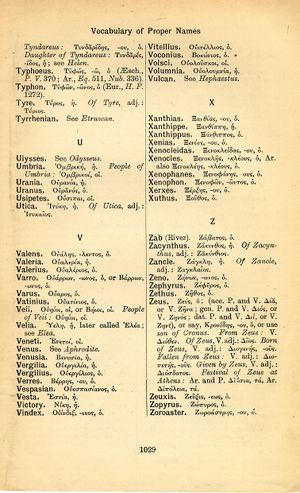Verres
εἰς δὲ θεοὺς ἀσεβείας τε καὶ εὐσεβείας καὶ γονέας καὶ αὐτόχειρος φόνου μείζους ἔτι τοὺς μισθοὺς διηγεῖτο → and he had still greater requitals to tell of piety and impiety towards the gods and parents and of self-slaughter
English > Greek (Woodhouse)
Βέρρης, -ου, ὁ.
Latin > English (Lewis & Short)
Verres: is, m.,
I the surname of the prœtor C. Cornelius, notorious for his bad government of Sicily; hence,
A Verrĭ-us, a, um, adj., of or belonging to Verres, Verrian: lex, that originated with him, Cic. Verr. 2, 3, 49, § 117.—
2 Subst.: Verrĭa, ōrum, n. (i. e. solennia), a festival appointed by Verres, Cic. Verr. 2, 2, 21, § 52; 2, 2, 46, § 114; 2, 2, 63, § 154; 2, 4, 10, § 24; 2, 4, 67, § 151.—
B Verrīnus, a, um, adj., of or belonging to Verres, Verrine: jus Verrinum, i. e. the mode of administering justice practised by Verres (in a sarcastic pun alluding to verrinum jus, pork-broth), Cic. Verr. 2, 1, 46, § 121.—
2 Subst.: Verrī-nae, ārum, f. (i. e. actiones); among grammarians, the orations of Cicero against Verres, Prisc. and Non. in mult. locc. (by Cic. himself called Accusatio).
Latin > French (Gaffiot 2016)
(2) Verrēs,⁸ is, m., C. Cornélius Verrès [propréteur en Sicile, attaqué par Cicéron dans ses Verrines] || -ĭus, a, um, de Verrès : Cic. Verr. 2, 3, 117 || Verrĭa, ōrum, n., Verries, fêtes en l’honneur de Verrès : Cic. Verr. 2, 2, 114 ; 4, 24, etc. || -īnus, a, um, de Verrès, v. jus : Cic. Verr. 2, 1, 121 ; Verrīnæ, ārum, f., les Verrines : Prisc. Gramm. 6, 8 ; Capel. 5, 491.

